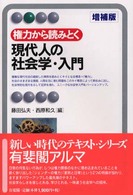- ホーム
- > 洋書
- > ドイツ書
- > Humanities, Arts & Music
- > Arts
- > theatre, ballett, film
Full Description
A major obstacle for the scholar of theatre is the ephemerality of a dramatic performance. How can we know the specifics of an event that has been and gone, an occurrence that can never be repeated? This book proposes that by considering the use of songs within a dramatic production we can gain a deeper understanding of past performances, especially with regard to their communal reception. Why did a playwright employ a certain song? How might it have affected an audience? Arguing that certain song types constitute forms of collective memory, the author explores Irish theatre from the 1950s and 1960s to show that songs are a valuable means by which we can gauge changes in the popular consciousness. By necessity, songs mutate so that they can continue to express and affirm collective memories and therefore fit the zeitgeist of their socio-cultural contexts.
Through its detailed research, this book demonstrates that retrospectively analysing the dramatic employment of well-known songs not only helps us better understand the performances and reception of a selection of Irish plays, but also challenges orthodox narratives of Éamon de Valera's Ireland.
Contents
CONTENTS: «And fond ones are flown»: Song, Memory, and Catharsis in John Murphy's The Country Boy (1959) - «Why do you always be singin' that oul' song?»: The Subversion of Emigrant Ballads in John B. Keane's Many Young Men of Twenty (1961) - «Gar O'Donnell and the Philadelphia»: Traditional Song and «The Irish Showband» in Brian Friel's Philadelphia, Here I Come! (1964) - «Erin, how fallen is thy fame!»: Song and Cynicism in Louis D'Alton's This Other Eden (1953) - «When Erin sings and laughs and shouts / Instead of always weeping O!»: Song, Nation, and Rejuvenation in Sean O'Casey's The Drums of Father Ned (1957) - «You died for old Ireland with a bullet in your bum»: Song, Satire, and Bardic Danger in John B. Keane's Many Young Men of Twenty (1961) - «Oh, who wouldn't be a tinker when he's free?»: Song and the Trope of the «Tinker» in Donagh MacDonagh's God's Gentry (1951) - «Tis the changing of the times»: «Tinkers» and Song Culture in John B. Keane's Sive (1959) - «Will they put us off the roads altogether?»: Song and the Travellers' Voice in The Honey Spike (1961) by Bryan MacMahon.






